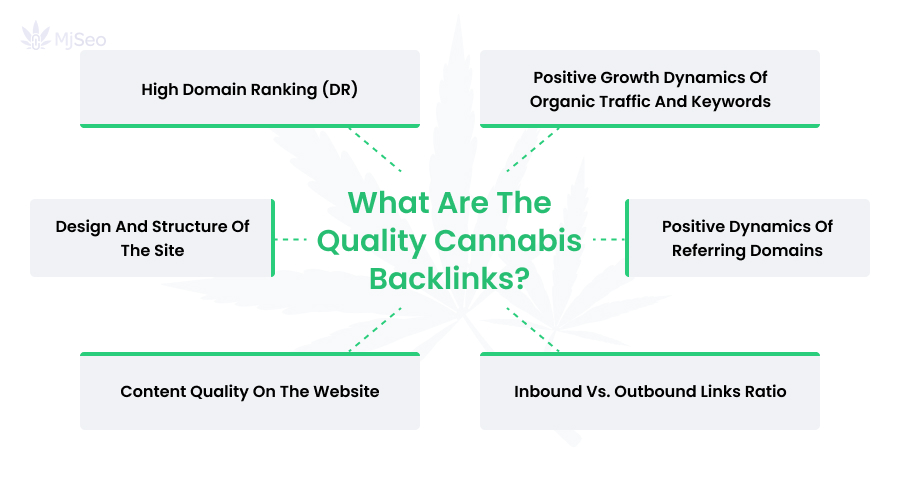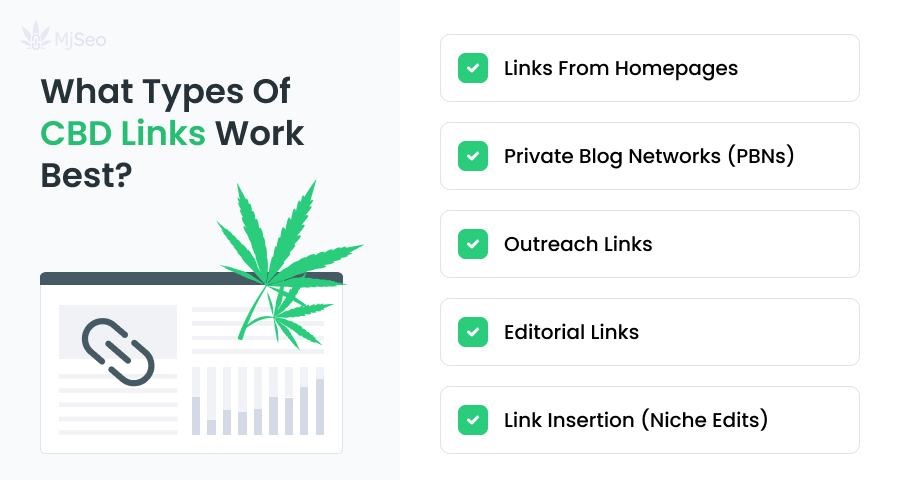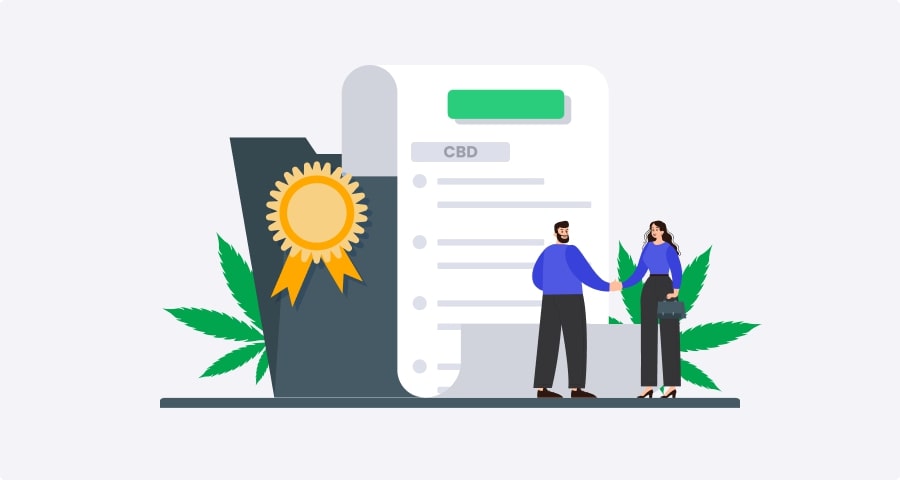How to Build Backlinks for Cannabis Websites?

The online presence of cannabis businesses plays a pivotal role, so the significance of high-quality backlinks cannot be overstated. Building a robust network of cannabis backlinks is a key strategy for enhancing visibility, authority, and organic traffic to your cannabis website.
High-quality backlinks act as a vote of confidence from other reputable websites, signaling to search engines that your cannabis website is trustworthy and relevant. Google and other search engines consider backlinks as a crucial ranking factor, making it essential to focus on building cannabis-specific backlinks. These backlinks not only drive targeted traffic to your website but also contribute to improving your website’s visibility in search engine results pages (SERPs).
In this article, we will delve into the realm of link building and explore effective techniques that can help you navigate the unique challenges and opportunities associated with building backlinks for cannabis websites. By understanding the principles and implementing proven strategies, you can pave the way for your cannabis website to flourish and thrive in the competitive online environment.
Why Are Backlinks Essential in the Cannabis Industry?
In the highly competitive cannabis industry, where online visibility and brand recognition are paramount, creating cannabis backlinks helps in establishing authority and gaining an edge over competitors. This is particularly important when targeting top keywords with high keyword difficulty (KD).
Keyword difficulty refers to the level of competition for a specific keyword in search engine rankings. Top keywords in the cannabis industry tend to have high KD scores, meaning numerous websites are vying for visibility and organic traffic. Thus, simply optimizing your website’s on-page elements may not be sufficient to rank prominently for these competitive keywords.
This is where backlinks come into play. The importance of backlinks in SEO is difficult to underestimate. Search engines consider them as an indication of the relevance and credibility of your content. By earning high-quality backlinks from reputable sources within the cannabis industry, you increase your chances of ranking higher in SERPs for top keywords.
For instance, let’s take the keyword “CBD gummies.” With a high KD score, it signifies intense competition among cannabis businesses to rank for this popular search term. In such cases, having a robust backlink profile can make a significant difference. Backlinks from authoritative cannabis-related websites that discuss or endorse CBD products, such as reputable industry blogs or publications, can boost your website’s credibility.
Similarly, the keywords “CBD,” “CBD oil,” “what is CBD,” and “CBD for dogs” are widely searched topics in the cannabis industry. To stand out and position your website as a trusted source of information or a reliable provider of CBD products, you need a strong backlink profile.
As you can see on the screenshot, the top pages that rank for these keywords also have large numbers of backlinks from different domains. Backlinks from influential cannabis industry directories, online forums, or trusted health and wellness websites can help establish your website’s authority, increase its visibility, and attract a steady flow of organic traffic.
How Do Backlinks Work?
Backlinks work by establishing connections between different websites. When a website links to another website, it essentially acts as a recommendation or reference, signaling to search engines that the linked website possesses valuable and relevant content. This endorsement through backlinks helps search engines determine the credibility, authority, and popularity of a website, influencing its ranking in search results.
Search engines like Google consider backlinks as one of the most important ranking factors. The quality and quantity of backlinks a website has can significantly impact its visibility and organic traffic. When search engines crawl the web, they analyze the backlinks pointing to a website to evaluate its reputation and authority within a particular industry or topic.
For example, if a popular cannabis industry blog links to your cannabis website, search engines interpret this as a vote of confidence and relevance. It suggests that your website offers valuable information or products related to the cannabis industry. Consequently, search engines may reward your website with higher rankings for relevant keywords, making it more likely to appear on the first page of search results.

Book a free consultation with one of our experts and learn how we can help you increase and scale your online presence.
Get a clear understanding of the opportunities available to your business with our tailored analysis and actionable recommendations.
What Are the Quality Cannabis Backlinks?

When it comes to building backlinks for marijuana companies, it’s crucial to focus on acquiring high-quality links that carry significant weight in the eyes of search engines. Here are some important criteria to consider when choosing cannabis backlinks:
- High Domain Ranking (DR): Look for websites with a domain ranking (DR) of 30 or higher. Domain ranking is a metric that indicates the overall authority and credibility of a website. Backlinks from high-DR websites hold more value and can boost your own website’s reputation.
- Positive Growth Dynamics of Organic Traffic and Keywords: Examine the target website’s organic traffic and keyword rankings over time. Consider websites that have a score of over 2000 in these metrics. A positive growth trend in these areas indicates that the website is attracting more visitors and performing well in search engine rankings. CBD backlinks from such websites can positively impact your own website’s visibility.
- Positive Dynamics of Referring Domains: Assess the number of referring domains that are linking to the target website. Look for websites that have at least 200 referring domains or more. A healthy growth in the number of referring domains signifies that the website is earning backlinks from diverse sources.
- Inbound vs. Outbound Links Ratio: Consider the ratio of inbound (links pointing to the target website) to outbound links (those from the target website to other websites). Ideally, the target website should have more inbound links than outbound ones, preferably at a ratio of around 2:1. This indicates that the website is considered a valuable resource by other websites, enhancing its authority.
- Content Quality on the Website: Evaluate the quality and relevance of the content published on the target website. High-quality, informative, and engaging content attracts more visitors and encourages other websites to link to it. Backlinks from websites with valuable content in the cannabis industry can bolster your own website’s credibility and expertise.
- Design and Structure of the Site: Consider the design and structure of the target website. A well-designed website with intuitive navigation and user-friendly features tends to provide a better user experience.
What Types of CBD Links Work Best?

In the realm of CBD link building, certain types of links have proven to be more effective in boosting the authority and visibility of cannabis websites. While it’s important to approach link building ethically and with a focus on quality, here are some types of CBD links that have shown positive results:
- Outreach Links: Outreach links involve reaching out to relevant websites, such as cannabis blogs, industry publications, or authoritative CBD websites, and requesting a link back to your website. This method requires a proactive approach, building relationships with webmasters or content creators to secure valuable CBD backlinks.
- Link Insertion (Niche Edits): This involves finding existing articles or blog posts on relevant websites and requesting to add a link to your CBD website within the existing content. This approach can be effective when the inserted link adds value and relevance to the article, benefiting both the target website and the linking website.
- Editorial Links: These are natural, non-promotional backlinks that are earned based on the quality and relevance of your CBD content. These links often result from reputable websites or industry influencers referencing your content as a reliable source of information. Creating high-quality, informative content can attract editorial links organically.
- Links from Homepages: Homepages of reputable websites within the cannabis industry can provide powerful backlinks. These links carry significant weight in search engine algorithms and can contribute to improving your website’s authority and visibility. Building relationships and partnerships with industry leaders or influential websites can help secure homepage cannabis links.
- Private Blog Networks (PBNs): This approach involves creating or utilizing a network of high-quality, authoritative websites that link back to your CBD website. While PBNs can be effective in boosting rankings, it’s essential to exercise caution as search engines have become more adept at identifying and penalizing artificial or manipulative link schemes. It’s crucial to ensure the PBN is well-managed, with quality content and natural linking patterns.
How to Build High-Authority Cannabis Backlinks?
Building high-authority cannabis backlinks requires a strategic and multifaceted approach. By employing various methods, you can effectively cultivate a robust network of backlinks that enhance the authority and visibility of your cannabis website.
Outreach
Proactive outreach involves reaching out to relevant websites, bloggers, and industry influencers to establish relationships and secure CBD backlinks. Personalized outreach emails, highlighting the value and relevance of your content or products, can be an effective way to earn high-quality backlinks from reputable sources within the cannabis industry.
Linkable Assets
Enhance the appeal of your content by incorporating linkable assets, such as compelling statistics about the growing industry, research findings, or infographics. By presenting valuable and data-driven information, you increase the likelihood of other websites referencing and linking to your content as a reliable and authoritative source.
Interviews and Podcasts
Engage with industry influencers, podcast hosts, or journalists who cover cannabis-related topics. Participating in interviews or podcasts provides an opportunity to showcase your expertise and earn cannabis backlinks from their websites or show notes, boosting your website’s authority and visibility.
Exhibitions and Sponsorships
Participating in cannabis-related exhibitions, conferences, or sponsorships can generate valuable cannabis backlinks. Event organizers often feature participating businesses on their websites, providing an opportunity for backlinks from reputable sources within the industry.
Guest Posts
Offer to write guest posts for cannabis industry blogs or publications. By providing high-quality and informative content as a guest author, you can earn backlinks within the author bio or within the body of the article, while also positioning yourself as an industry expert and driving targeted traffic to your website.
Link Exchange
Engage in strategic link exchanges with complementary businesses or industry partners within the cannabis space. Establishing mutually beneficial partnerships can lead to organic cannabis backlinks, as you refer visitors to each other’s websites, expanding your reach and authority.
Unlinked Brand Mentions
Monitor online platforms, social media, and industry forums for unlinked brand mentions. When your cannabis website or brand is mentioned without a hyperlink, reach out to the website owner or content creator and kindly request they turn the mention into a clickable backlink. This technique can help you reclaim valuable backlink opportunities.
Pillow Links (Forums, Directories)
Participate in cannabis-related forums or directories and include your website link in your profile or signature. While these types of links may carry less weight in search engine algorithms, they can still contribute to building a diverse backlink profile and driving targeted traffic to your website.
Things to Consider When Building Links
When building backlinks for cannabis websites, it’s essential to be aware of certain difficulties and restrictions that may arise. Here are some important considerations and potential warnings to keep in mind:
Legal and Regulatory Restrictions
The cannabis industry operates within a complex legal and regulatory landscape. Depending on the jurisdiction, there may be restrictions on promoting or advertising cannabis-related products or services. Ensure you comply with local laws and regulations when engaging in link building activities to avoid any legal repercussions.
Limited Link Opportunities
Due to the specific restrictions of the cannabis industry, it can be more challenging to find authoritative and relevant websites for link building. Some mainstream platforms may have policies against promoting cannabis-related content, limiting the pool of potential linking opportunities. It requires extra effort and creativity to identify and secure quality cannabis backlinks within the cannabis niche.
Limited Advertising Platforms
Advertising platforms such as Google Ads and social media platforms may have specific policies and restrictions around promoting cannabis-related products or services. This can limit the options for paid advertising or sponsored content to support your link building efforts. Familiarize yourself with the policies of each platform to ensure compliance.
Reputation and Trustworthiness
Given the sensitivities surrounding the cannabis industry, establishing a reputable and trustworthy online presence is crucial. Linking with untrustworthy or spammy websites can negatively impact your reputation and search engine rankings. Prioritize quality over quantity when selecting linking opportunities, ensuring they align with your brand values and industry standards.
Compliance with Link Building Guidelines
While link building is an important aspect of cannabis SEO, it’s essential to adhere to search engine guidelines to avoid penalties. Avoid engaging in black-hat SEO practices, such as buying or participating in link schemes, as search engines can detect and penalize such activities. Focus on organic and natural link building methods to build a sustainable backlink profile.
DIY Link Building vs. Professional Agency

When it comes to building backlinks for marijuana companies, you have the option to either handle it yourself (DIY) or hire a professional link building agency. Both methods have their own pros and cons. Here’s a comparison table to help you evaluate which approach may be more suitable for your needs:
DIY Link Building
| Pros | Cons |
|
|
Professional Agency
| Pros | Cons |
|
|
It’s important to consider the scale of your link building needs and the resources available to you. To effectively scale link building efforts and maximize results, utilizing professional cannabis link building services is often the preferred choice. The expertise, industry connections, and specialized resources of these service providers can streamline the process, ensuring a more efficient and impactful strategy for building high-quality cannabis backlinks on a larger scale.
Bottom Line
To thrive in the competitive CBD market, don’t underestimate the power of building high-quality cannabis backlinks. Invest in a comprehensive link building strategy and consider partnering with a reputable agency specializing in the cannabis niche. By leveraging their expertise, you can strengthen your online presence, drive organic traffic, and establish your CBD website as a trusted and authoritative source in the industry.
Take the first step toward enhancing your CBD website’s visibility and authority. Reach out to an agency providing professional cannabis link building services today and unlock the full potential of your online presence.
We've helped dozens of clients achieve remarkable results by increasing organic traffic and revenue for their online businesses. Let us put our expertise to work for you and help you reach new heights of success.








